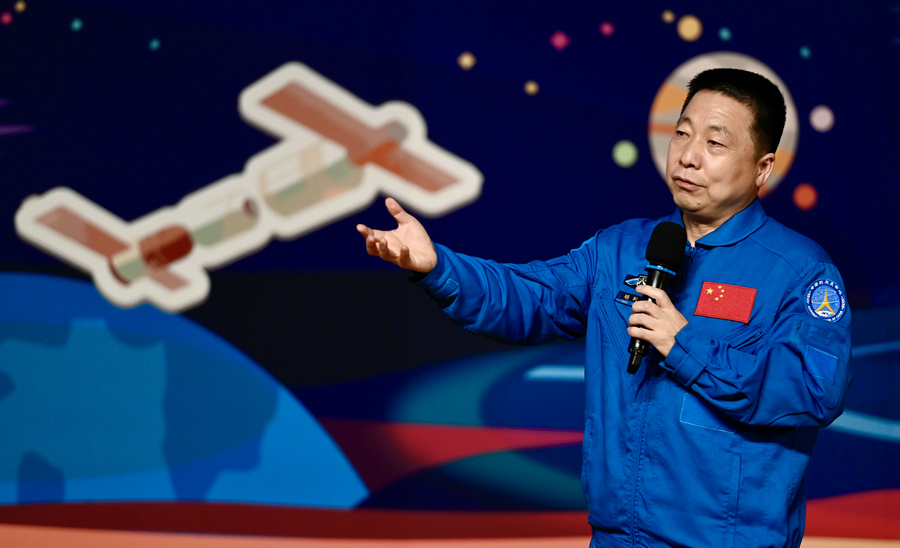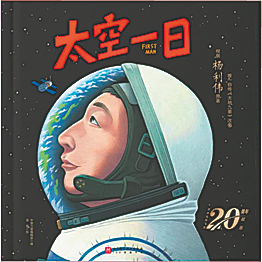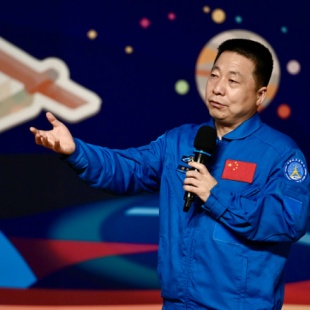Picture book marks 20th anniversary of China's manned space flight


Authorized by Yang Liwei, China's first astronaut to enter space, the Beijing Science and Technology Press published the picture book First Man on Sunday, marking the 20th anniversary of the country's first manned space flight.
The book relives the whole process of Yang's historic flight in October 2003, including the liftoff, in-orbit flight and return to Earth of the Shenzhou-5 spacecraft, using vivid pictures.
This book is an opportunity for science publishers to introduce the story of Yang Liwei and the Shenzhou V mission to readers, allowing them to get to know the Chinese space hero better.
The content of the picture book is based on Yang's autobiography, Long March to Space, which was published in 2010. Part of the book's content was included in the country's middle school textbook in 2021, which soon became a trending topic on social media networks.
"My director asked me to do some research about the book. So I bought the autobiography and was moved by the detailed stories in it. Thus, I decided to turn it into a picture book," says Wu Xiaoxi, editor from the publisher.
Her idea won support from Yang, who later accepted an interview with the publisher's editorial team for the new picture book.
"When I was a student, I learned about Yang from the news and thought he was great and admirable," Wu says. But it was just an abstract feeling, Wu adds.

After reading his autobiography, Wu realized that Yang remained as real and interesting as an ordinary person.
"When I talked with him face to face, I found that he was exactly the same as depicted in the autobiography, with active and clear thinking, while also being broad-minded, tenacious and fearless," Wu says.
Jin Xing, illustrator of the picture book, also secured a fresher and clearer impression of the country's first space traveler.
After Shenzhou V re-entered the atmosphere, Yang saw what he believed were cracks in the portholes, and the temperature outside was between 1,600 and 1,800 C. Once back on Earth, he found out that it was the heat-resistant coating covering the portholes instead of the windows that had burned and cracked.
"I have repeatedly imagined those thrilling moments in my mind, amazed at how hard this space journey was and how marvelous the astronaut was," Jin says.
When Jin submitted the sketches, Wu was touched by the pictures illustrating Yang's actions in orbit, such as stretching out his hand as if to touch the floating dust and waving goodbye to the quiet immensity of space.
Twenty years after the space mission, Yang reviews the development of China's manned spaceflight in the afterword of this picture book.
The country's manned spaceflight missions have been lengthened from one day to multiple days, and are performed simultaneously by multiple astronauts, which reflects the rapid development of China's space technology.
"Every astronaut and every aerospace worker is proud of this spirit of continuous innovation and pursuit of perfection," Yang says.
Yang has not conducted a flight mission since 2003. He has gradually changed from a trainee to an instructor and administrator, and often attends science popularization events.
"The lectures from the Tiangong space station, favored by many students, was initiated by Yang," Wu says.
To that, Yang say: "What remains unchanged is that I still keep the original aspiration of an astronaut, and always stay ready to serve our motherland."
Wu and her colleagues remind readers that there is a surprise in the book — a page showing a rabbit staring at the moon.
"We are all looking forward to the next leap of China's manned space program — the manned lunar landing," says Wu. "We expect to produce more high-quality picture books at that time."





































